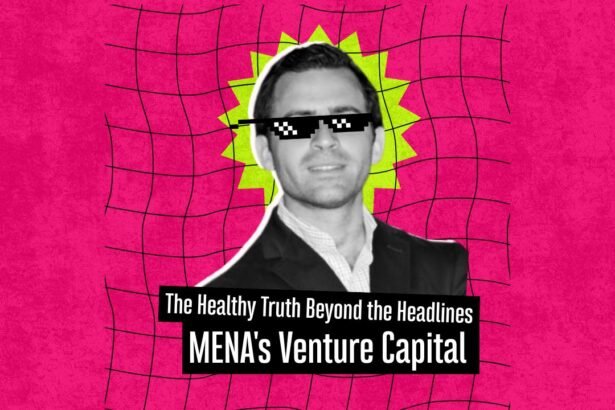Heard the whispers about money drying up for startups in our part of the world (MENA)? Well, don’t believe everything you hear! Philip Bahoshy, the super-smart data guy from Magnitt, says there’s a “story to every number”. And the real story? It’s much cooler than the grim headlines suggest.
The “Doom & Gloom” Narrative – A Hilarious Misunderstanding
So, the grown-ups in the news said money for startups went down, maybe even 40%. Sounds scary, right? But Philip says, “if you remove the anomalies of the 21 and 22 [super-crazy years], Venture investment is still higher to a certain extent than what we saw in 2019 and 20 which were record years compared to the last 10 years gone by”. Think of it like this: if you remove the two biggest ice cream cones you ever ate, you’re still eating more ice cream now than you used to! This means the startup world here is actually “extremely healthy” underneath all the big numbers.
Why did the big numbers look bad? It’s because of “mega-deals” – those super-duper huge investments of $100 million or more. They used to make up close to 75% of all the money put into startups in 2021-2022. But now, they’re only about 25-30%. But here’s the cool part: smaller, earlier investments actually went UP! For example, in Saudi Arabia, there were 16% more deals, even if the total money looked down. This isn’t a problem; it’s like building a house with a stronger foundation first!
Why did big investors slow down? Philip explains it like this: when interest rates (how much money banks give you for keeping your cash) were super low, everyone put their money into risky startups because there weren’t many other good places to put it. But then, interest rates went up! Now, you can get 5-6% just by keeping money in the bank. So, for investors to take a risk on a startup, they need to believe they can get a much, much bigger return – like 25-35% every year. That’s tough! But Philip is “bullish” about 2025, hoping things will get better when interest rates come down again.
Smart Moves for Startup Builders – Founders –
If you’re building a startup, listen up! Philip says, “always put yourself in the shoes of the person that you’re negotiating with”. That means understanding investors. Here’s what you need to do:
- Do Your Homework (Seriously!) – Before you even think about asking for money, “Do they have money to deploy? Is your company the right type of company that they would be interested in?” Don’t just spray and pray; be smart about who you talk to.
- Be a Human, Not Just a Pitcher – At events, don’t just jump on investors with your pitch. Philip says, your main goal is to “create a human connection”. Talk about football, summer plans, anything to make them remember you. You often only get one chance to make them want a second meeting.
- Is Your Idea Really for Big Investors? – Let’s be honest: not every great business needs money from big venture capitalists. VC money is mostly for “hyperscale at all cost” tech companies that can grow super, super fast. If your business is amazing but not designed for that kind of speed, it’s totally okay! Focus on making money and growing steadily.
- Don’t Be Afraid to “Copy-Paste” – Philip says, “every company that has been successful… have been copy paste”. If you take a good idea that works somewhere else and make it work perfectly for our local market, that’s smart! It’s about “creat[ing] an efficiency where inefficiency exists using technology”.
- Be Smart with Money – The days of spending tons of cash to grow are out. Now, you need to be “much more frugal in terms of mindset” because it takes longer to get new money8. Make your money last longer!
- Get “IPO Ready”- Even if you don’t plan to go public (IPO) right away, cleaning up your company’s papers, finances, and rules (like getting “IPO ready”) makes you much more attractive to bigger investors later. It shows you’re serious and well-managed.
Smart Moves for Money-Movers – Investors –
For those with money to put into startups, here’s your chance:
- Look Beyond the “Unicorn” Dream – While a super-huge company (unicorn) is a dream, Philip says the idea of only chasing them is “flawed for the ecosystem development”. We need “more 50, 100, 200, 500 million exits”. These smaller, but still big, successes create returns for more founders, employees, and early investors, which helps the whole startup world grow bigger and stronger for the future!
- Be Patient, Grasshopper – Your best investments often happen when the economy is a bit slow. Philip says, “your payoff is in 7 to eight years where one hopes that the economy returns and we start seeing that bull cycle again”. Don’t pull back your investments now, because they could pay off big later.
- Think About “Private Equity” (PE) – This is a “massive opportunity” for our region. PE funds can help companies that are too grown-up for traditional startup money but not yet ready for the stock market. They can give these companies the capital to focus on making profits and prepare for a good exit. This area needs more support from governments.
- AI Software is the Next Big Wave – While lots of money is going into big AI machines, Philip expects “almost a doubling of investment in AI native and enabled solutions that are going to be coming from the region”. Get in early on the software side of AI!
- “Search Funds” – This is a cool, often overlooked idea: people finding traditional businesses (like construction or retail) that are old-school and modernizing them with technology. Not every valuable business needs to be a “tech unicorn”.
The Big “Exit” Puzzle , and why it’s changing ?
Getting startup companies bought by bigger companies (M&A) or having them go public (IPOs) is still a big challenge, with M&A down for three years in a row.
Why?
IPOs are Tricky – Everyone wants more IPOs because they’re a clear way for investors, founders, and even employees to get their money back. But here’s the rub: our region’s rules often say companies must be making a profit before they can list on the stock market. This is different from more “relaxed” markets like the US. Regulators here want to protect regular people who buy stocks. So, it’s not just about wishing for more IPOs; there’s a lot of work and serious discussions needed to make it happen fairly.
What’s Next for MENA – 2025 and Beyond-
Philip looks into his crystal ball for 2025 and here’s what he sees:
- More Money, But Not Crazy Like Before – Total money put into startups will be “higher than 2024”, but it will be a steady growth, not a wild, “hockey stick” jump like during the crazy COVID years. Later-stage and mega-deals should start coming back as interest rates cool down.
- AI, AI Everywhere – Expect “a doubling of investment in AI native and enabled solutions”right here in our region. Get ready for the AI takeover!
- The MENA-Southeast Asia Bromance Continues – There will be “a continued strengthening of relations”47 between these two regions. Think more government visits, more investors, and more ideas flowing both ways. It’s like a new Silk Road, but for startups!
- Global Investors Are Back in Town – More big international investors will set up offices here and put their money into our startups. This means more competition for local companies, but also more opportunities and more money flowing in!
- More IPOs! – Philip predicts “about four to five” new IPOs in 2025, especially in Saudi Arabia and the UAE, likely in the second half of the year.
So, ditch the doom and gloom. The MENA VC story is far from over. In fact, it’s just getting to the good part! It’s about “patience, continued investment in the market” and understanding the real story behind the numbers.




